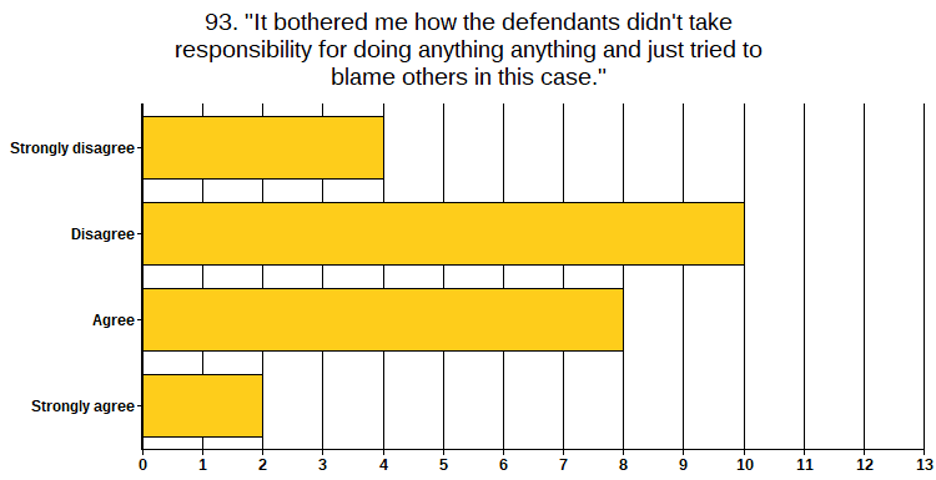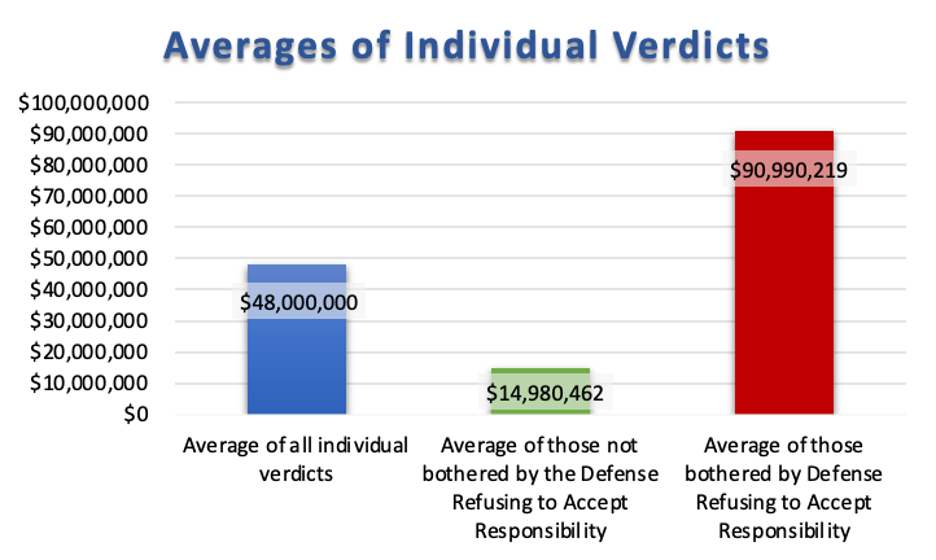
ALWAYS. ACCEPT. RESPONSIBILITY. “But why accept responsibility if my client didn’t do anything wrong?” is a typical retort. As Robert Tyson, renowned trial lawyer and author of Nuclear Verdicts: Defending Justice For All, explains, accepting responsibility will help “defuse the number one source of runaway jury verdicts: anger.”1 Accepting responsibility in order to lessen juror anger does not mean that you must admit liability.
What does this look like in the courtroom, and how can you use this technique effectively? According to Tyson, it would look something like this, using as an example a company taking responsibility for introducing a safe product into the stream of commerce: Defense counsel, after accepting responsibility for putting a safe product on the market, describes everything done to make that product safe. Counsel can enumerate the thousands of hours of research and development, engineering, safety testing, drafting a manual, independent certification, and training. In this specific example, defense counsel accepts no portion of liability, but is still accepting responsibility for something.2
How else can you use responsibility to reduce juror anger? Be genuine and authentic when acknowledging the harms to the plaintiff, offering a reasonable damages number grounded in reality. You will be less likely to receive an outrageous verdict than if you avoid accepting responsibility and, where appropriate, liability altogether.
Jurors are intelligent: If liability is obvious, it is usually smarter to admit it because juror anger will grow as they uncover the truth. Failure of the defense to accept liability when appropriate changes the jury’s attention “to instantly look for any hole in the defendant’s argument.”3 How dangerous to have your jurors narrowly focused on undermining your argument. “Once there’s a perceived flaw in a defendant’s argument, the defendant’s credibility begins to erode.”4 It is hard enough to gain the jurors’ trust. Don’t waste the goodwill you’ve gained by foolishly thinking they won’t notice.
By acknowledging responsibility for something, you become the most reasonable person in the courtroom: A trusted leader. This benefits you as it shifts the jurors’ attention to comparing your reasonableness to that of the Plaintiff’s. “The defendant admits they weren’t perfect, but does the plaintiff?” is a common thought you have planted in the jurors’ minds. If the plaintiff refuses to admit any responsibility, jurors may begin to further scrutinize the evidence, placing the burden of proof on its rightful owner, the Plaintiff.
Having conducted mock trials and jury trials in courtrooms across the nation, our team has witnessed the defense try various strategies of accepting or refusing responsibility. The graph below is one example of a case where the defendants did not admit any guilt whatsoever. Our jurors gave real-time feedback after the Defendants’ presentation in a negligence case involving the death of a child. The Defendants’ accepted no responsibility for anything that happened to that child in their care.

At first glance, it may seem that this graph proves the opposite of Tyson’s Accept Responsibility advice: Less than half of the jurors were bothered by the fact the defendants failed to accept responsibility. But, when we analyze the money verdicts, we can see the value of Accepting Responsibility. In this case, the average of our jury’s individual verdicts was $48 million. Looking only at the average award of those ten jurors who indicated they were bothered by the defense’s failure to accept responsibility, the verdict was $90,990,219… almost TWO TIMES the average of all individual verdicts! Even more shocking is the fact that the average individual verdict of those ten jurors who were bothered by the failure to accept responsibility was more than six times the average of those jurors who indicated they were not bothered.

Our private jury trial process also breaks the panel into smaller deliberation groups to analyze how the group dynamic influences individual jurors’ verdicts. Three of the four deliberation groups believed that the defense was negligent. Within those three groups, the damages awarded were significant, averaging almost $70 million… the stuff of defense attorneys’ nightmares.
More significantly, of those four groups, two were led by forepersons who indicated they were bothered by the Defendants’ failure to accept any responsibility. Out of the ten jurors with that belief, two were passionate enough to become a foreperson. Thus, not only was the juror impacted by the failure to accept responsibility to give an extraordinary individual verdict, that juror then became a leader in the deliberations influencing higher monetary awards.
What’s the key to avoiding such verdicts? The first step is to accept responsibility. If you are reasonable in your approach, you can simultaneously diffuse juror anger and establish yourself as the trusted leader in the courtroom.
Want more insights about First Court’s experience with jury verdicts? Check out our blog series on LinkedIn where we delve into each of Tyson’s ten points one-by-one, drawing from the advice in his book while combining the thought leadership of prominent plaintiff and defense attorneys who have experienced both sides of a nuclear verdict. Also check out Give a Defense Number: the next blog in our LinkedIn blog series about circumventing nuclear verdicts.
- Tyson Jr., Robert F. Nuclear Verdicts: Defending Justice for All (Law Dog Publishing, LLC., 2020), 14.
- Tyson Jr., Robert F. “Should You Accept Responsibility at Trial?” Claims and Litigation Management Alliance (https://www.theclm.org/Magazine/articles/should-you-accept-responsibility-at-trial/2039, June 27, 2020)
- Ibid, 21.
- Ibid.
Tags:
Jury Research
Apr 10, 2023 5:06:29 PM



.jpg?width=520&height=294&name=Blog%20Post%20Images%20(1).jpg)

Comments